CORPORATE ACTION: Coca-Cola
Coca-Cola Fails to Increase Reusable Packaging Goals
CORPORATE ACTION: Henkel
EU Regulation Targets Sustainable Packaging Changes
 In an interview with Carsten Bertram, Head of Packaging Sustainability for Henkel Consumer Brands, Bertram highlights the EU's new Packaging and Packaging Waste Regulation aimed at enhancing sustainability in packaging. The regulation, effective from January 2025, focuses on reducing single-use plastics, increasing recycling rates and promoting reusable packaging solutions. It introduces stricter requirements for packaging design to facilitate recycling and mandates improved environmental labeling. Henkel supports these measures, viewing them as a critical step toward a more sustainable packaging industry.[Image Credit: © Henkel AG & Co. KGaA]
In an interview with Carsten Bertram, Head of Packaging Sustainability for Henkel Consumer Brands, Bertram highlights the EU's new Packaging and Packaging Waste Regulation aimed at enhancing sustainability in packaging. The regulation, effective from January 2025, focuses on reducing single-use plastics, increasing recycling rates and promoting reusable packaging solutions. It introduces stricter requirements for packaging design to facilitate recycling and mandates improved environmental labeling. Henkel supports these measures, viewing them as a critical step toward a more sustainable packaging industry.[Image Credit: © Henkel AG & Co. KGaA]
CORPORATE ACTION: L’Oréal
Kiehl’s Launches Refill Campaign To Cut Plastic Waste
 L’Oréal beauty brand Kiehl’s introduced its “Don’t Rebuy. Just Refill” campaign to encourage customers to reduce single-use plastic by opting for refillable product formats. This initiative is part of Kiehl's broader sustainability goals, including reducing plastic waste and promoting a circular economy. The campaign features refill pouches, which save up to 80 percent plastic compared to standard packaging. Kiehl’s invites consumers to bring in empty containers for discounted refills at in-store stations.[Image Credit: © Kiehl’s Since 1851]
L’Oréal beauty brand Kiehl’s introduced its “Don’t Rebuy. Just Refill” campaign to encourage customers to reduce single-use plastic by opting for refillable product formats. This initiative is part of Kiehl's broader sustainability goals, including reducing plastic waste and promoting a circular economy. The campaign features refill pouches, which save up to 80 percent plastic compared to standard packaging. Kiehl’s invites consumers to bring in empty containers for discounted refills at in-store stations.[Image Credit: © Kiehl’s Since 1851]
CORPORATE ACTION: PepsiCo
PepsiCo Partners On AI To Improve Recycling Accuracy
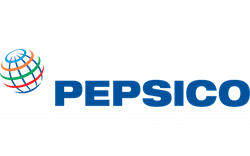 PepsiCo and Intuitive AI teamed up to deploy the Oscar Sort AI recycling system across high-traffic US locations, including offices, universities and stadiums. Oscar Sort uses AI to detect materials and guide users in proper recycling, aiming to improve recycling accuracy and waste diversion. It provides real-time feedback and educates consumers with an interactive experience, encouraging better disposal habits. The partnership supports PepsiCo’s sustainability strategy, pep+ Partners for Tomorrow, by enhancing transparency and circularity in material recovery. [Image Credit: © PepsiCo]
PepsiCo and Intuitive AI teamed up to deploy the Oscar Sort AI recycling system across high-traffic US locations, including offices, universities and stadiums. Oscar Sort uses AI to detect materials and guide users in proper recycling, aiming to improve recycling accuracy and waste diversion. It provides real-time feedback and educates consumers with an interactive experience, encouraging better disposal habits. The partnership supports PepsiCo’s sustainability strategy, pep+ Partners for Tomorrow, by enhancing transparency and circularity in material recovery. [Image Credit: © PepsiCo]
CORPORATE ACTION: Unilever
Unilever And AEPW Join Forces To Combat Plastic Waste
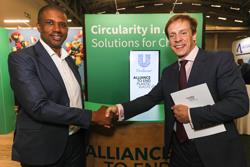 Unilever and Alliance to End Plastic Waste, an NGO funded and founded by industry, signed a Memorandum of Understanding in Cape Town, South Africa, to enhance plastic waste management and recycling in the region. Every year, around 3.67 million tonnes of waste in the country is not collected, leading to significant environmental issues. The partnership will explore innovative solutions for plastic waste management, seeking funding opportunities to foster a circular economy. By collaborating with various stakeholders, including Producer Responsibility Organisations and financial institutions, the initiative aims to drive systemic change in addressing plastic waste challenges in South Africa and Sub-Saharan Africa.[Image Credit: © Alliance to End Plastic Waste]
Unilever and Alliance to End Plastic Waste, an NGO funded and founded by industry, signed a Memorandum of Understanding in Cape Town, South Africa, to enhance plastic waste management and recycling in the region. Every year, around 3.67 million tonnes of waste in the country is not collected, leading to significant environmental issues. The partnership will explore innovative solutions for plastic waste management, seeking funding opportunities to foster a circular economy. By collaborating with various stakeholders, including Producer Responsibility Organisations and financial institutions, the initiative aims to drive systemic change in addressing plastic waste challenges in South Africa and Sub-Saharan Africa.[Image Credit: © Alliance to End Plastic Waste]
Greenpeace Releases Spoof Dove Ad, Attacking Dove’s Sustainability Credentials
 Greenpeace UK created a spoof ad to mark the 20th anniversary of Dove’s “Real Beauty” campaign, exposing the plastic waste record of the brand and its parent, Unilever. “Toxic Influence: The Dark Side of Dove” mimics Dove’s 2022 ad but highlights the environmental impact of the brand’s plastic waste. Greenpeace claims that Dove alone used 6.4 billion plastic sachets in 2022, and Unilever uses 1,700 per second globally. Starkly contrasting with Dove’s positive marketing, the ad urges Unilever to phase out single-use plastics and adopt reusable materials. It follows Greenpeace’s recent protest at Unilever’s headquarters.[Image Credit: © Greenpeace UK]
Greenpeace UK created a spoof ad to mark the 20th anniversary of Dove’s “Real Beauty” campaign, exposing the plastic waste record of the brand and its parent, Unilever. “Toxic Influence: The Dark Side of Dove” mimics Dove’s 2022 ad but highlights the environmental impact of the brand’s plastic waste. Greenpeace claims that Dove alone used 6.4 billion plastic sachets in 2022, and Unilever uses 1,700 per second globally. Starkly contrasting with Dove’s positive marketing, the ad urges Unilever to phase out single-use plastics and adopt reusable materials. It follows Greenpeace’s recent protest at Unilever’s headquarters.[Image Credit: © Greenpeace UK]
Greenpeace Protests Against Dove Brand At Unilever’s London HQ
 Greenpeace UK activists blocked Unilever’s London headquarters with oversized Dove products and a modified ‘Dead Dove’ logo to protest the company’s inadequate response to plastic pollution and recent rollback of sustainability goals. The demonstrators barricaded the building’s entrances and were joined by climbers displaying a large canvas on the facade. This action is part of Greenpeace’s campaign urging Unilever to eliminate single-use plastics, particularly sachets, and support stricter plastic reduction targets at the upcoming UN Global Plastics Treaty negotiations. [Image Credit: © Unilever]
Greenpeace UK activists blocked Unilever’s London headquarters with oversized Dove products and a modified ‘Dead Dove’ logo to protest the company’s inadequate response to plastic pollution and recent rollback of sustainability goals. The demonstrators barricaded the building’s entrances and were joined by climbers displaying a large canvas on the facade. This action is part of Greenpeace’s campaign urging Unilever to eliminate single-use plastics, particularly sachets, and support stricter plastic reduction targets at the upcoming UN Global Plastics Treaty negotiations. [Image Credit: © Unilever]
Knorr Adopts Recyclable Paper For Stock Cubes

Unilever’s Knorr brand is replacing its multi-layer aluminium wrapper to recyclable paper in the UK. Following a successful pilot in Tesco, it will be rolled out across all retailers and the core stock cube during this month. [Image Credit: © Unilever]
CORPORATE ACTION: Other
Aluminum Bottles Replace Plastics At Chicago Events

Culligan International, in partnership with the United Center, Chicago Bulls and Blackhawks, is helping to reduce plastic waste by introducing aluminum water bottles at the Chicago Marathon and sports events. These BPA-free bottles will replace single-use plastic bottles at concession stands, and Culligan will install new refilling stations and recycling bins at the venue.[Image Credit: © Culligan]
ESG Award Recognizes Liverpool FC Sustainability Efforts
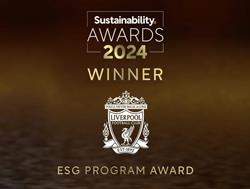
Liverpool FC won an ESG Award at the Global Sustainability Awards. Its initiatives include reducing plastic waste, improving energy efficiency and promoting sustainable practices and includes a partnership with SC Johnson that led to a circular recycling process, transforming plastic bottles from Anfield into new products. This initiative has contributed to a 30 percent reduction in overall waste since 2019.[Image Credit: © BizClik Media Limited]
UK Retailers Struggle To Scale Refill Initiatives
 Supermarkets in the UK face challenges in scaling refillable concepts, with trials from major retailers like Lidl, Asda M&S and Tesco failing to gain momentum due to operational issues and lack of infrastructure. Despite consumer interest in reducing plastic waste, logistical barriers and economic challenges limit success. No one country has solved the problem, but some are trying harder. France, Chile and Austria have adopted more ambitious regulations that promote refill systems, spurring innovation and consumer adoption. France mandates that large supermarkets dedicate 20 percent of floor space to refill stations by 2030. Some countries, like the Philippines, have more embedded reuse and refill traditions, such as the Tingi culture of buying and selling exact amounts in sari-sari stores using reusable containers. [Image Credit: © Polina Tankilevitch from Pexels]
Supermarkets in the UK face challenges in scaling refillable concepts, with trials from major retailers like Lidl, Asda M&S and Tesco failing to gain momentum due to operational issues and lack of infrastructure. Despite consumer interest in reducing plastic waste, logistical barriers and economic challenges limit success. No one country has solved the problem, but some are trying harder. France, Chile and Austria have adopted more ambitious regulations that promote refill systems, spurring innovation and consumer adoption. France mandates that large supermarkets dedicate 20 percent of floor space to refill stations by 2030. Some countries, like the Philippines, have more embedded reuse and refill traditions, such as the Tingi culture of buying and selling exact amounts in sari-sari stores using reusable containers. [Image Credit: © Polina Tankilevitch from Pexels]
SEC Charges Keurig Dr Pepper Over K-Cup Recyclability

In the US, the Securities and Exchange Commission charged Keurig Dr Pepper for allegedly misleading investors about the recyclability of its K-Cup coffee pods. KDP stands accused of falsely promoting its pods as recyclable, knowing that most will end up in landfills. SEC’s charge highlights growing concerns about corporate responsibility and environmental impact, and the increased scrutiny companies will face in providing accurate information about their environmental practices and product sustainability. [Image Credit: © Keurig Green Mountain, Inc.]
CAMPAIGNS, COMMITMENTS & NGOs
Bold Action Needed For Reuse Systems In Europe
 Zero Waste Europe calls for stronger policies to boost reuse systems for takeaway packaging, highlighting both environmental and economic benefits. Its recent report suggests switching to reusable packaging could significantly reduce greenhouse gas emissions, but reuse systems are neglected because hidden cost of single-use options, such as litter cleanup and environmental damage, are ignored. The report says taxes should level the playing field and suggests stronger regulatory actions, including setting reuse targets or banning single-use packaging.[Image Credit: © cottonbro studio from Pexels]
Zero Waste Europe calls for stronger policies to boost reuse systems for takeaway packaging, highlighting both environmental and economic benefits. Its recent report suggests switching to reusable packaging could significantly reduce greenhouse gas emissions, but reuse systems are neglected because hidden cost of single-use options, such as litter cleanup and environmental damage, are ignored. The report says taxes should level the playing field and suggests stronger regulatory actions, including setting reuse targets or banning single-use packaging.[Image Credit: © cottonbro studio from Pexels]
Ireland’s DRS Hits 500 Million Container Milestone
 Ireland's Deposit Return Scheme, launched in February 2024, recovered over 500 million plastic bottles and cans to date. Operated by Re-turn, the scheme encourages consumers to return containers at over 2,500 Reverse Vending Machines and 350 manual return points nationwide. Month-on-month, the scheme has seen continuous growth, supporting EU recycling targets and reducing landfill and litter. [Image Credit: © Re-turn]
Ireland's Deposit Return Scheme, launched in February 2024, recovered over 500 million plastic bottles and cans to date. Operated by Re-turn, the scheme encourages consumers to return containers at over 2,500 Reverse Vending Machines and 350 manual return points nationwide. Month-on-month, the scheme has seen continuous growth, supporting EU recycling targets and reducing landfill and litter. [Image Credit: © Re-turn]
Consumer Demand Fuels Shift Toward Sustainability Initiatives
 Initiatives like Plastic Bank’s programs allow businesses to integrate recycled plastics into their supply chains, helping to reduce plastic waste while supporting ethical collection systems in coastal communities. Consumers are now more inclined to support brands that align with their values of reducing plastic pollution, pushing companies to innovate and adopt more sustainable practices. This consumer-driven momentum is helping advance the circular economy and reduce plastic waste globally.[Image Credit: © Tom Fisk from Pexels]
Initiatives like Plastic Bank’s programs allow businesses to integrate recycled plastics into their supply chains, helping to reduce plastic waste while supporting ethical collection systems in coastal communities. Consumers are now more inclined to support brands that align with their values of reducing plastic pollution, pushing companies to innovate and adopt more sustainable practices. This consumer-driven momentum is helping advance the circular economy and reduce plastic waste globally.[Image Credit: © Tom Fisk from Pexels]
Consumer Brands Push To Broaden Plastic Recycling Definition
 As the Federal Trades Commission reviews its Green Guides, guidance for brands and government agencies on the definition of terms like “recyclable”, the Consumer Brands Association is urging US regulators to relax the definition of "recyclable" plastics. They want packaging materials like plastic shopping bags and toothpaste tubes to carry recyclable labels, despite limited recycling infrastructure, on the basis they are technically recyclable even if their likely destination is landfill. Critics argue this could lead to more "wishcycling," where consumers mistakenly believe certain items are recycled. [Image Credit: © Mike van Schoonderwalt from Pexels]
As the Federal Trades Commission reviews its Green Guides, guidance for brands and government agencies on the definition of terms like “recyclable”, the Consumer Brands Association is urging US regulators to relax the definition of "recyclable" plastics. They want packaging materials like plastic shopping bags and toothpaste tubes to carry recyclable labels, despite limited recycling infrastructure, on the basis they are technically recyclable even if their likely destination is landfill. Critics argue this could lead to more "wishcycling," where consumers mistakenly believe certain items are recycled. [Image Credit: © Mike van Schoonderwalt from Pexels]
ALLIANCES, PARTNERSHIPS & JVs
Scaling Reuse Systems For A Circular Economy
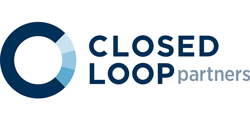 Closed Loop Partners emphasizes the critical need to scale reusable systems as part of the transition to a circular economy. Its investments focus on advancing reuse to combat plastic waste. Aerflo, one of its investment beneficiaries, is developing software and infrastructure solutions to make reuse systems more efficient. Key challenges include building localized infrastructure, such as collection and cleaning facilities, and shifting consumer behavior. [Image Credit: © Closed Loop Partners]
Closed Loop Partners emphasizes the critical need to scale reusable systems as part of the transition to a circular economy. Its investments focus on advancing reuse to combat plastic waste. Aerflo, one of its investment beneficiaries, is developing software and infrastructure solutions to make reuse systems more efficient. Key challenges include building localized infrastructure, such as collection and cleaning facilities, and shifting consumer behavior. [Image Credit: © Closed Loop Partners]
POLICY, REGULATION & LEGAL
EPR Laws Demand Clearer Consumer Recycling Education
 Minnesota's new Extended Producer Responsibility law, enacted in May 2024, holds brands accountable for the disposal of their product packaging, requiring them to invest in consumer education to improve recycling. Despite rising eco-consciousness, a recent study by Package InSight showed that only half of sustainably minded consumers check packaging for recycling instructions, relying instead on intuition, which often leads to incorrect disposal choices. Misleading use of the “chasing arrows” recycling symbols, for example, results in plastics sent to recycling facilities unable to recycle them. [Image Credit: © Jan van der Wolf from Pexels]
Minnesota's new Extended Producer Responsibility law, enacted in May 2024, holds brands accountable for the disposal of their product packaging, requiring them to invest in consumer education to improve recycling. Despite rising eco-consciousness, a recent study by Package InSight showed that only half of sustainably minded consumers check packaging for recycling instructions, relying instead on intuition, which often leads to incorrect disposal choices. Misleading use of the “chasing arrows” recycling symbols, for example, results in plastics sent to recycling facilities unable to recycle them. [Image Credit: © Jan van der Wolf from Pexels]
INNOVATION & TECHNOLOGY
UK Reusable Packaging Initiative Expands To Combat Plastic Waste
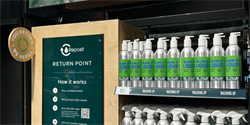 Reposit’s returnable packaging scheme, backed by M&S, Ecover and City to Sea, is expanding across the UK. Launched in 2023 with support from UK Research & Innovation’s Smart Sustainable Plastic Packaging Fund, the program promotes a "buy anywhere, return anywhere" system that enables customers to return packaging for reuse. Key brands like Beauty Kitchen, ARRAN Sense of Scotland and Mama Bamboo have joined, with reusable packaging available across multiple channels. The scheme focuses on incentivizing returns, professional cleaning and re-circulating packaging. [Image Credit: © City to Sea]
Reposit’s returnable packaging scheme, backed by M&S, Ecover and City to Sea, is expanding across the UK. Launched in 2023 with support from UK Research & Innovation’s Smart Sustainable Plastic Packaging Fund, the program promotes a "buy anywhere, return anywhere" system that enables customers to return packaging for reuse. Key brands like Beauty Kitchen, ARRAN Sense of Scotland and Mama Bamboo have joined, with reusable packaging available across multiple channels. The scheme focuses on incentivizing returns, professional cleaning and re-circulating packaging. [Image Credit: © City to Sea]
RESEARCH
London Packaging Waste Drives High Carbon Footprint
 A new report by ReLondon, Valpak and WRAP reveals that packaging used in London generates 4.1 million tonnes of CO2 emissions annually—equivalent to half of the city's transport emissions—with plastic packaging the largest contributor. Nearly 250kg per person of packaging waste is discarded each by residents, visitors and businesses, with only a fraction recycled. The study, launched during Circular Economy Week, emphasizes the importance of innovations like recycled content, reuse systems and packaging reductions to curb the city’s waste footprint. Key interventions could cut emissions by up to 23 percent. With most emissions tied to the packaging supply chain before reaching consumers, urgent changes are needed to address the full environmental impact of plastic waste.[Image Credit: © ReLondon]
A new report by ReLondon, Valpak and WRAP reveals that packaging used in London generates 4.1 million tonnes of CO2 emissions annually—equivalent to half of the city's transport emissions—with plastic packaging the largest contributor. Nearly 250kg per person of packaging waste is discarded each by residents, visitors and businesses, with only a fraction recycled. The study, launched during Circular Economy Week, emphasizes the importance of innovations like recycled content, reuse systems and packaging reductions to curb the city’s waste footprint. Key interventions could cut emissions by up to 23 percent. With most emissions tied to the packaging supply chain before reaching consumers, urgent changes are needed to address the full environmental impact of plastic waste.[Image Credit: © ReLondon]
OTHER NEWS
Capri Sun Urges Plastic Straw Reintroduction
 Capri Sun has requested the European Commission reconsiders its plastic straw ban, arguing that paper straws are not functional or practical. Despite improvements to paper straws, the company argues they complicate the recycling of its juice pouches, and consumers don’t like them. Critics in turn point out that plastic straws contribute to pollution and question their recyclability. [Image Credit: © Capri-Sun]
Capri Sun has requested the European Commission reconsiders its plastic straw ban, arguing that paper straws are not functional or practical. Despite improvements to paper straws, the company argues they complicate the recycling of its juice pouches, and consumers don’t like them. Critics in turn point out that plastic straws contribute to pollution and question their recyclability. [Image Credit: © Capri-Sun]
Copyright 2026 Business360, Inc.

